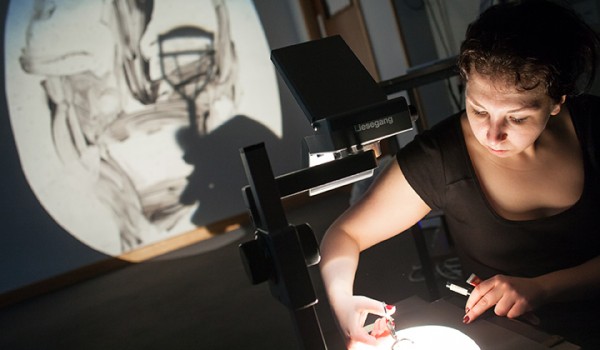The programme notes state that the creative process was motivated by the question; ‘is it possible to adapt a novel for the stage and still allow the audience to imagine the characters as if they were reading?’ The answer is a resounding YES, as this very accurately describes my experience of the piece. The writer, Bea Roberts, is also sole performer, or might more accurately be described as ‘operator’ since she is largely engaged in managing the various audio-visual devices that generate this augmented reading experience.
Loosely based on Flaubert’s 1856 novel Madame Bovary (but with no prior knowledge required), Infinity Pool follows the story of an unhappily married admin assistant, Emma, and her burgeoning romance with a disgruntled customer, Kick. Emma is unhappy with her figure, obsessed with images of celebrity perfection and partial to a Michael Hutchence fantasy. Her first encounter with Kick is via the online helpdesk that she oversees as part of her job at a plumbing supplies firm, and from then on their interactions are conducted entirely through emails and text messages.
Whilst the onstage performer occasionally ‘stands in’ for Emma, neither she nor Kick are ever depicted directly to the audience, just suggested via images of their surroundings, an atmospheric soundscape, and animated text projections representing their messages. Speech between other characters is similarly shown, with different fonts used to signify the utterances of different characters and media of communication. There are some moments of live performance in the form of object animation, such as the projection of adverts onto hastily unfurled paper sheets, and a wonderful suggestion of nightlife indulgence achieved through the play of plastic glasses on the overhead projector.
This impressionistic audio/visual collage generates the story so effectively in the imagination of the audience that, just as when engrossed in a good novel, it’s easy to imagine you’ve actually heard the characters’ voices. Actors beware: this show demonstrates how little you are actually needed. Indeed, the few sections where we do hear the voices of secondary characters are perhaps the least satisfying – a written line can be imagined spoken authentically, whilst a performed line usually betrays some hint of artifice. But this is not really a criticism, and the local radio host and mother’s answerphone message are enjoyable enough. In fact there is nothing about this production that isn’t enjoyable.
The beauty of the writing is that it creates believably human characters through everyday exchanges with great efficiency and without needless literary flourishes. What I found most refreshing was that this innovative form of multi-media theatre was used to convey a wholly accessible story about ordinary people in ordinary circumstances, which ordinary people might easily relate to and deeply enjoy. It is by turns a humorous and moving story, full of engaging characters and finely crafted to deliver a poetically satisfying end.
Bea Roberts: Infinity Pool was shortlisted for a Total Theatre Award 2016 in the Emerging Artist category.

